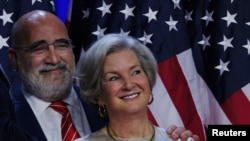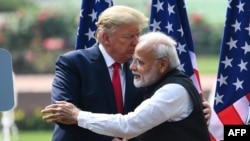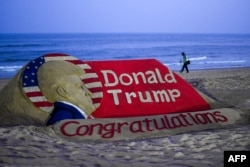
With her appointment as chief of staff to President-elect Donald Trump, Susie Wiles moves from a largely behind-the-scenes role of campaign co-chair to one of the most prominent positions in a new White House administration.
The 67-year-old will become the first woman to serve in the post for any U.S. president when she assumes the role as the president's closest adviser in January.
In announcing his decision Thursday, Trump said Wiles is "tough, smart, innovative, and is universally admired and respected.” It was his first appointment since winning Tuesday’s election against Vice President Kamala Harris.
“It is a well deserved honor to have Susie as the first-ever female Chief of Staff in United States history. I have no doubt that she will make our country proud," Trump said in his statement.
Wiles largely avoided the spotlight during her time as co-chair of Trump’s successful election campaign and was credited — along with co-campaign manager Chris LaCivita — with bringing some discipline to Trump’s free-wheeling, off-script campaign style.
She didn’t speak during Trump’s victory celebration early Wednesday morning when he called her to the podium, and she refused to take the microphone.
Wiles rarely gives televised interviews and tends to avoid the spotlight, a contrast with LaCivita, who is known for being outspoken.
For someone of her stature, she is not well-known in political circles. During his victory speech, Trump referred to Wiles as the "ice maiden.”
She is one of Trump’s most trusted advisers. During a rally in Milwaukee, Wisconsin, earlier this month, he said: “She’s incredible. Incredible.”
Top Trump pollster Tony Fabrizio told Politico in April, “There is nobody, I think, that has the wealth of information that she does. Nobody in our orbit. Nobody.”
While Wiles is a somewhat enigmatic figure, she has a long career of working behind the scenes in U.S. politics.
Shortly after she graduated from the University of Maryland in 1979, she went to work for New York Congressman Jack Kemp and joined Ronald Reagan’s presidential campaign in 1980.
She eventually moved to Florida where she advised the campaigns of two Florida mayors and helped then-businessman Rick Scott transition to politics in his successful 2010 campaign for governor.
She managed Utah Governor Jon Huntsman Jr.’s presidential bid in 2012, and managed Florida for Trump’s 2016 campaign. She joined Ron DeSantis’ race for governor in 2018, but she parted ways with him after a falling out in 2019.
Wiles made a rare appearance on social media shortly before DeSantis dropped out of the presidential race in January. “Bye, bye,” she wrote.
She went on to run Trump’s primary campaign against DeSantis, which Trump easily won.
Wiles is the only campaign manager to survive an entire Trump campaign and is known for her ability to tamp down his mercurial, sometimes volatile behavior.
In one anecdote reported by The Associated Press, during a campaign speech in Pennsylvania when Trump strayed off his talking points and quipped about not minding if members of the media were shot, she came out and silently stared at him until he got back on track.
That ability should serve her well in her new role. In his last four years in office, Trump went through four chiefs of staff, a record for modern presidents.
Some information in this report was provided by The Associated Press.


























